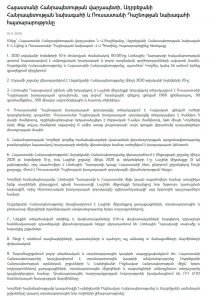During a meeting between the leaders of Armenia, Azerbaijan and Russia on January 11, Russian President Vladimir Putin referred to the implementation of the trilateral statement signed on November 9, 2020.
“Today we can state with satisfaction that the trilateral agreement is being implemented consistently,” Putin said.
According to him, in the first place, the statement basically refers to the complete cessation of hostilities, the deployment of Russian peacekeepers in the region, the provision of assistance to the civilian population affected by the military conflict for them to return to normal life.
The Fact Investigation Platform has studied the events that took place after the November 9 statement to find out whether the clauses of the statement are being observed.
The statement of November 9
On November 9, the Prime Minister of Armenia Nikol Pashinyan, the President of Azerbaijan Ilham Aliyev and the President of Russia Vladimir Putin signed a joint statement consisting of 9 clauses.
According to the statement, the Parties shall remain at their current positions, Armenia shall return Aghdam, Kelbajar and Lachin regions to Azerbaijan, an exchange of prisoners of war shall be carried out, the peacekeeping troops of the Russian Federation shall be deployed, economic and transport links in the region shall be unblocked, refugees shall return, a peacekeeping center shall be deployed, and so on.
Which clauses of the statement have been implemented?
As of now, the Armenian side has handed over to Azerbaijan the regions of Aghdam (Akna), Kelbajar (Karvachar), Lachin (Kashatagh) in accordance with the 2nd and 6th clauses of the statement.
Along the line of contact and along Lachin corridor, peacekeeping troops of the Russian Federation were deployed in accordance with Clause 3 of the statement.
On December 1, Russia and Turkey signed an agreement on the establishment of a joint ceasefire monitoring center in Nagorno Karabakh, in accordance with Clause 5.
As for Clause 9 on unblocking the economic and transport links in the region, an additional statement was signed during the January 11 meeting in Moscow. According to the statement, a working group will be established, which will hold the first meeting before January 30, 2021.
Which clauses have been violated?
According to the Clause 1, after establishment of the ceasefire, the parties shall remain at their positions.
During the hostilities, the Azerbaijani armed forces managed to capture all the settlements in the Hadrut region, except for the villages of Khtsaberd and Hin Tagher. Thus, according to the statement, they were to remain under the control of Armenian forces. However, on December 12, units of the Azerbaijani Armed Forces attacked two villages, and, as a result, they also came under the control of Azerbaijan. During the same operation, 62 Armenian servicemen were taken prisoner. In other words, Clause 1 of the statement was actually violated.
According to Clause 8 of the statement, the prisoners of war, hostages and other detained persons, and the bodies of the dead were to be exchanged.
On December 9, three Armenian prisoners were handed over to the Armenian side.
On December 14, 44 officially confirmed prisoners were transferred to Armenia. Then, on December 28, 4 more citizens were returned. However, according to lawyers, 120 prisoners are currently being held in Azerbaijan. Sixty-two of them, who were captured in the Khtsaberd and Hin Tagher section, have been arrested, and an investigative process has been initiated against them in Azerbaijan. On the other hand, the Prosecutor’s Office of Azerbaijan has stated that as of January 5, there were 5 prisoners of war and 2 civilian prisoners in their country. Thus, it is obvious that Clause 8 of the November 9 statement is not being implemented. Moreover, Azerbaijan is creating obstacles for its implementation.
The subject of discussion was the handover of those parts of Zangelan and Kubatlu regions near Kapan and Goris on December 18, which were not occupied by Azerbaijan during the hostilities, because, according to the first clause, the parties had to remain at their positions, and, thus, it was claimed that this clause has also been violated.
In an interview with Petros Ghazaryan, Prime Minister Nikol Pashinyan referred to this issue, insisting that the first clause referred only to the Artsakh line of contact. “And I have said before that since at the time of the signing of the November 9 statement, 90% of the Kubatlu and Zangelan regions were unfortunately already under the control of Azerbaijan, there was a verbal understanding in that context that there we need to specify certain border points, not the border itself,” Pashinyan said.
As for the return of internally displaced persons and refugees to the territory of Nagorno-Karabakh and the surrounding areas referred to in Clause 7, it is unclear whether any active action has yet been taken.
Thus, Vladimir Putin’s statement that the trilateral agreement is being implemented consistently is not true.
Loosineh Voskanyan

 FACTOMETER
FACTOMETER











